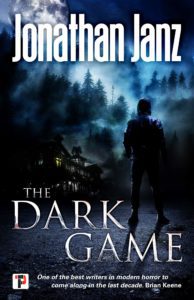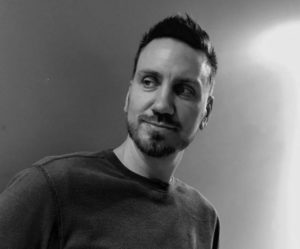Certainly not a new name in the industry, Jonathan Janz has been steadily building his reputation, and bibliography, consistently delivering bone-chilling horror for nearly a decade. Author of The Sorrows, Dust Devils, Savage Species, Children of the Dark, Exorcist Falls, and most recently, The Siren and The Specter and The Dark Game, Janz has found new success with Flame Tree Press, re-releasing his back catalogue as well as his new releases. Children of the Dark was chosen by Booklist as a Top Ten Horror Book of the Year, just another milestone in a career filled with numerous awards … and he’s just getting started. Jonathan spends his free time with his wife and children, but after growing up between a dark forest and a graveyard, he lets the darkness comes out on the page, exposing what lurks in the shadows of the night. You can find Jonathan over at twitter @jonathanjanz.
What was the impetus for writing this story?
JJ: Even though Stephen King is my favorite writer, and he often writes about writers in his stories, I’d never really taken that leap and made an author my main character. Yes, I wrote House of Skin, in which a writer “receives” stories from a supernatural source, and I mentioned the profession briefly in The Darkest Lullaby, I’d never really examined the craft of writing in a story, and I’d never really tried to inhabit a writer’s soul. But in The Dark Game, that’s what the book is all about.
I began writing it back in 2013, and back then, I really didn’t have the skills or the experience necessary to do the story justice. I’d experienced plenty of rejection, so I knew that part of it well, but I hadn’t had enough go right in my career to speak to how success might look, nor did I know many authors back then well enough to ask them what some of the perils of success might be.
In 2016, I took another stab at the novel, and this time it worked much better. I’d been wanting to bring the sensibility of William Golding’s Lord of the Flies and Peter Straub’s Shadowland, so hopefully the magic of those works informed my book at least a little bit.
What lessons—good and bad—did you learn writing this story?
JJ: I learned not to put off something just to put it off. Essentially, I’ve always believed the story is the boss (which also means the characters are in charge), but I’ve occasionally found myself imposing arbitrary structural guidelines on a piece. For this one, I thought half of it would take place in the past (meaning the writers’ retreat) and the other half would take place in the present (ten years after the writers’ retreat), and that’s why, back in 2013, I’d gotten to the 65,000-word mark and nothing had really happened yet. Oh, sure, there was a lot of good character stuff, but we weren’t even close to anybody dying, and, well, for a book like this, that needs to happen earlier.
So on the rewrite, I ditched the past/present dichotomy and found that the story flashed back plenty anyway when I got into the characters’ histories. There were also a good many tangents into the characters’ own books, both the ones they were writing for this contest and the ones they’d written in the past. It’s a very layered story, so when I gave up that unnecessary structural idea, it all started to flow much better. It was still very long in rough draft—probably close to 180,000 words—but by cutting and cutting and making difficult choice after difficult choice, I got it down to under 100,000.
While I still write long, I don’t write that long anymore. Unless I’m planning on the book being a doorstop, in which case I’ll make it as long as it needs to be. Marla, for instance (a book I’ve just started editing), was 138,000 in rough draft and will end up around 100,000 or 105,000. The novel I’m writing now will likely be my longest ever. The rough draft will probably end up around 150,000, and the finished draft will probably clock in at around 130,000.
If you were to write this again what would you do differently?
JJ: I sort of answered this above, but another thing I’d probably do is spend less time crafting excerpts of each of the authors’ stories. Originally, there were excerpts of all ten novels, and some of these excerpts were several chapters long. Lucy’s section, which was cut to a single line in the published version of The Dark Game, used to be around eight thousand words. So there was a place I could have preemptively cut, but then again, writing those excerpts was fun and offered me more insight into my characters. Plus, I saved all that stuff, so if I do an author’s preferred version someday, I’ll have plenty of material.
Describe your writing routine whilst writing this story and how long did it take you from first draft to final edit?
JJ:Every book is different, and this one was just bizarre with how it all unfolded, so let me just share what I try to do. The following is a description of what I’ve done this summer on my current work-in-progress.
Since I teach high school and junior high, I have my summers to write, and I can usually write at least a novel every summer (my goal is two novels per year). This summer I finished one novel (Marla) on June 6th and started my current book the next day. I write five or six days a week during the summer. I get up between six and seven-thirty, depending on how late my kids kept me up the night before, and write as much as I can before noon. On a good day, I’ll knock off four thousand words. On a bad day, I’ll fall shy of three thousand. But three thousand is the goal, and anything over that is gravy.
I write in my writing room/library, which is on the northeast corner of the house. Outside to my left, there’s a beautiful magnolia tree. My chair is, I think, faux leather from Sam’s Club. I’ve had it for about twelve or thirteen years, and it is beyond cozy. There’s a matching ottoman where I rest my feet. To my right is a small stand where I set my coffee (always a must), my water, and a granola bar or two (my breakfast). Also on the stand is a CD player, on which I play Baroque music. I have a few compilations that include Bach, Vivaldi, and many others. Several of the CDs feature Yo Yo Ma and his cello.
As I write this, it is July 3rd, and I’ve just passed the 82,000-word mark in my book. By the end of July, I’ll be nearly at my 150,000-word (estimated) target. Again, the story is the boss, so maybe it’ll be 140,000, maybe it’ll be 160,000. But I’m pretty sure it’ll end up somewhere in that range.
Once I finish, I’ll start editing it (actually, I’ll edit Marla first, but for the sake of this analysis, let’s say I’m editing this one first). I’d start editing in August and edit every weekend until, say…the end of November? At that time, I’ll finish it and decide what to do with it. My editing is its own laborious process, and I feel that’s when the story really becomes something I can be proud of. I’m not a great writer, but I’m a pretty strong editor (of my own work), and I think that’s as important as the actual writing.
What stories, films, tv shows, and art directly and indirectly influenced this story?
JJ: So many diverse sources. As I’ve already talked a little about the novels that inspired the book, let me mention some other sources that impacted it. I know there were quite a few folks who didn’t like the American remake of Ju-On (which itself was an influence on the scene I’ll refer to below), but I found quite a bit to like in The Grudge. There’s a scene with Anna Holloway and…a presence in The Dark Game that folks who’ve watched either Ju-On or The Grudge will find interesting.
Another influence on The Dark Game was the work of Chuck Palahniuk. I don’t think I’ve spoken much about him in other interviews, but I’ve read quite a bit of his stuff and always find his style interesting. In Tommy’s novel excerpt (Flesh Diary), I channeled a little bit of Paluhniuk to capture Tommy’s worldview and how I thought he would try to write. It’s a little labored, and it’s supposed to be. But I think it’s exactly how Tommy Marston would write, and I used it for that reason.
What were the biggest challenges you faced writing this story?
JJ: Regardless of how folks feel about it, there’s no denying that The Dark Game a pretty sizable beast, not just with regard to word count, but in its scope. You have ten contestants with ten backstories and ten novels they’re trying to write. Additionally, you have some of their past works. Added to that you’ve got the catalogues of Roderick Wells and Corrina Bowen, and those two characters’ backstories. Then we’ve got supporting characters like Amanda Wells, Wilson, and Miss Lafitte, and that doesn’t even get into all the backstories for all the characters referenced above (the characters populating the contestants’ backstories, for instance).
So what I’m getting at is that this novel contains something like forty or fifty different stories that I attempted to weave together in a coherent, propulsive narrative. Hopefully, the reader feels like it all works, but trying to choreograph everything took some doing. I haven’t even mentioned yet my desire to connect the many different strands together. For instance, both Lucy’s previously published books and the book she writes at the retreat have to reflect parts of her, both her personality and her experiences. And they need to be “feel complete” even if they weren’t actually complete. And then they need to connect to her larger narrative and arc, and hopefully intersect with the other characters in interesting ways. For folks who’ve finished the book, they’ll know that the story of her former agent (Fred Morehouse) links really well with the book she writes at the retreat. Or at least I think it does.
What do you hope readers get out of this story?
JJ: Most of all, I hope they have a really good time. After that, I hope they feel like the characters have serious flaws, but that these flaws are believable and, in some cases, relatable. Hopefully, none of us have done what Will Church and Rick Forrester have done in The Dark Game, but I’ll bet a lot of us can relate to the guilt both of them feel for their past actions. Will and Rick are both essentially good people, but they’ve made serious mistakes. Most of us have made mistakes too that cause us to question our own goodness. So maybe reading this will help some people to give themselves a little grace. Lastly, I think the themes in The Dark Game are interesting. I hope folks look at Bryan Clayton and feel like his behaviors and feelings connect to relevant topics in today’s society.
Ten writers. A summer long retreat. Their host: the most celebrated and reclusive author ever, Roderick Wells. He promises to teach these writers about writing, and about magic.
He will teach them all about the darkness lurking in the hearts.
They think they’ve signed up for a once-in-a-lifetime chance at fame and fortune. But Wells is deranged, a genius hellbent on pitting them against each other in a battle for their sanity … and their lives.
Unwittingly, they’ve entered into Well’s most horrible creation … The Dark Game
Buy The Dark Game by Jonathan Janz
BOB PASTORELLA











